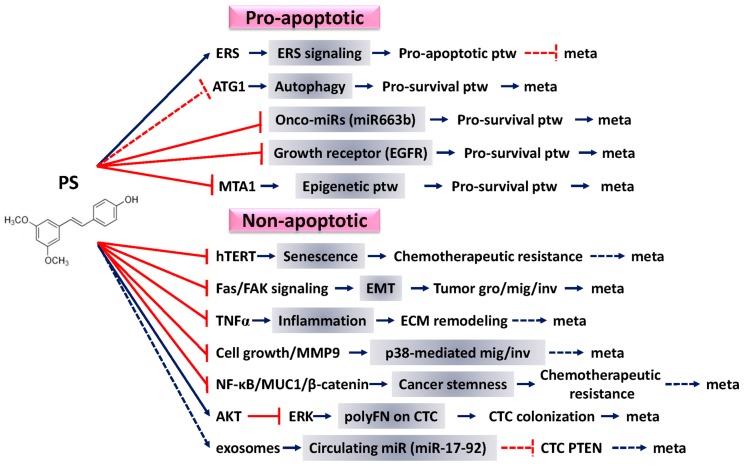Figure 2.
The overview of anticancer properties of pterostilbene (trans-3,5-dimethoxy-4-hydroxystilbene; PS). PS are able to target apoptosis-dependent and -independent signaling pathways against cancer progression and likely cancer metastasis. The key events affected by PS in all the pathways are boxed in grey color. In the category of pro-apoptotic effects, PS inhibits onco-miRs (e.g., miR663b) and growth factors (e.g., EGFR), triggers an epigenetic modification through the inhibition of MTA1, induces ERS, or lowers autophagy through the inhibition of ATG1. In the category of nonapoptotic effects, most of the effects caused by PS are shown to inhibit pro-tumor signaling pathways including hTERT, Fas/FAK signaling, TNFα, cell growth/MMP-9, NF-κB/MUC1/β-catenin, AKT/ERK signaling axis, and packed in circulating sEVs that are involved in senescence prevention, EMT, inflammation, p38/mediated migration/invasion, and cancer stemness, polyFN assembly on CTCs, and miR17-92-delivery in the circulation, respectively. All these apoptosis-dependent and -independent inhibitory effects caused by PS likely lead to a reduction of cancer metastasis. Note: signaling events involved in the anti-metastatic activities of PS are depicted as solid or broken lines whenever supported or not yet supported (only logically deduced), respectively, by the literature. The corresponding full names abbreviated are listed as follows: ptw, pathway; meta, metastasis; gro, growth; mig, migration; inv, invasion.

